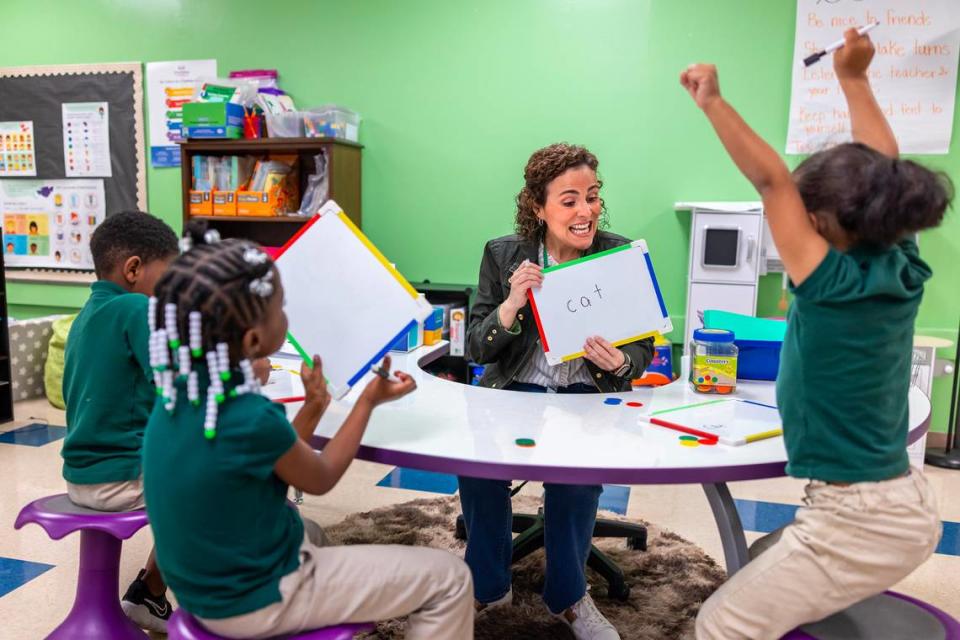UNC Charlotte gets ‘transformational investment’ from NC group to create new center
The University of North Carolina at Charlotte will receive a historic gift to help it address the state’s reading problems.
The Mebane Charitable Foundation, a nonprofit based in Mocksville, selected UNC Charlotte’s Cato College of Education for a five-year grant and potential endowment of up to $23 million. UNC Charlotte was the top finisher in a competitive statewide search, and the gift is one of the largest in the university’s history, according to a university spokesperson.
The announcement comes after a 2022 UNC System Board of Governors report that designated the UNC Charlotte as “strong” in literacy instruction, the highest rating achievable. UNC Charlotte is the only North Carolina public university to earn the distinction.
“From the leadership team down through the college’s faculty and teacher candidates, focus on early childhood literacy is embedded in the Cato College,” said Marianne Mebane, chair of the Mebane Foundation Board. “It will provide world-class opportunities for some of the brightest young teachers in our state while at the same time supporting young struggling readers, both inside and outside the classroom.”

The foundation will provide an investment that culminates in an endowment of up to $23 million in five years. It will result in the “Allen Mebane: Leaving a Legacy for Future Generations” endowment to create the Mebane Early Literacy Center. The college of education building also will be renamed Mebane Hall later this year.
Mebane Foundation leaders identified UNC Charlotte as a partner to continue to carry on its work as the foundation winds down operations over the next decade, the spokesperson said.
“This transformational investment will take Charlotte’s highly-rated literacy programming and clinical experiences and move our teacher candidates to the next level,” UNC Charlotte Chancellor Sharon L. Gaber said.

Cato College is the No. 2 producer of teachers in the state behind East Carolina University, and it has more than 7,500 graduates employed in North Carolina public schools, according to its website. About 1,701 UNC Charlotte alumni are teaching in Charlotte-Mecklenburg Schools and 148 UNC Charlotte alumni are working in CMS as principals or assistant principals.
A combined 1,720 UNC Charlotte graduates are working in Cabarrus, Union, Gaston and Rowan-Salisbury public school districts.
Focusing on reading
George Allen Mebane, who worked in the textile industry and founded and ran Universal Textured Yarns, established the Mebane Foundation in 1998 to support “innovative educational endeavors,” according to its website.
The foundation’s website says Mebane believed, “All people learn on a different timeline. But if you create the right tool, everyone can learn at their own pace, and after a period of time, end up at the same destination.”
Mebane and others also started the textile company Unifi, Inc., and over 30 years, grew the company to where sales topped $1.5 billion, according to his obituary. The company became the largest producer and processor of textured yarns in the world, with plants in the United States, England, Brazil and Ireland. In 2000, Allen retired from Unifi, Inc. and directed his efforts toward the Mebane Charitable Foundation. He died in November 2008.
The foundation says it’s given more than $25 million to educational programs across the state in the past 25 years, with a particular focus on reading and literacy.
In 2019, the foundation invested in UNC Charlotte’s summer reading camps, which serve elementary school students across the region. They are also a setting for teachers in training to apply new educational techniques.
The foundation also provided additional support to develop UNC Charlotte’s Project Enrich, which provides evidence-based reading tutoring year round to elementary school students who underperform in reading.
Student reading skills
Nationally, about one-third of fourth grade students are proficient in reading, according to the National Assessment of Educational Progress, also known as the nation’s report card.
Student performance in reading slid sharply in North Carolina and Charlotte-Mecklenburg Schools 2022 NAEP results showed when they were released in the fall. The percentage of students displaying at least basic reading skills was lower than in 2003, when CMS began participating in the NAEP district-level assessment.
“Nationwide, students are struggling to read at grade level,” said Malcolm Butler, dean of the Cato College of Education. “A child’s future and the future of our society are tied closely to literacy rates.”
But CMS officials reported Tuesday night at a school board meeting that across the last three years, the percentage of students meeting or exceeding their growth projects in reading has steadily increased.
Officials reported 49% of students in Grades 2-8 have met or exceeded their growth target in reading this school year.
In 2020-21, 43% of students in grades 2-8 met their fall to winter growth projections in reading. In 2021-22, 44% of students in grades 2-8 met their growth projections in reading.
Officials also told the board that four schools — Dilworth Elementary — Sedgefield Campus, Allenbrook Elementary, Reid Park Academy and Walter G. Byers have seen double-digit percentage point growth in reading since the 2020-21 school year.

